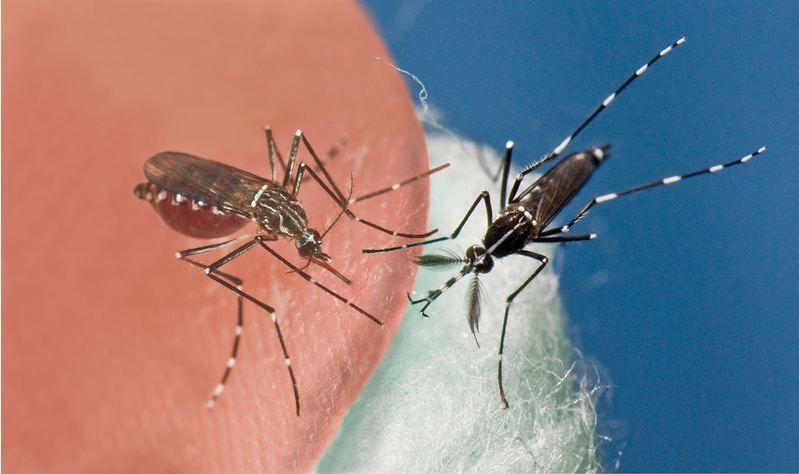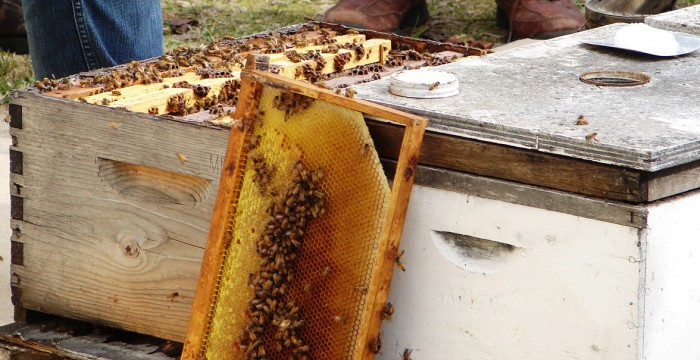Judy Biss, UF/IFAS Extension Calhoun County Office, Jace Ford, Calhoun County Mosquito Control, Jeff Pippin, Florida Department of Agriculture and Consumer Services Apiary Inspection
By now you have probably heard about Zika Virus that is transmitted by mosquitoes. As a beekeeper, you may be concerned about the safety of your bees during pesticide treatments to control mosquitoes. As a rural landowner, you probably have more places where mosquitoes can live and lay their eggs than a homeowner who lives in the city. Below are a few facts and resources for you to consider in managing disease carrying mosquitoes.
The Background:
Zika was discovered in 1947 in the Zika Forest of Uganda, Africa from a sentinel monkey that was being used in a yellow fever research project. It was first isolated from a human in Nigeria in 1954. The mosquitoes that can carry the Zika virus live here in Florida, and are known as “container mosquitoes,” specifically, the yellow fever mosquito, and the Asian tiger mosquito. These mosquitoes can, and do, lay their eggs in water trapped in containers, and they don’t require very much water to complete their life-cycle. They even use the small amounts of water trapped in bromeliad plants! When water covers their eggs, they hatch and become adults in about a week.

Two mosquito species in Florida are potential vectors of the Zika virus: Aedes aegypti and Aedes albopictus. Photo credit: University of Florida, Florida Medical Entomology Laboratory.
The Outbreak:
Currently, an outbreak of Zika Virus is circulating in central and South America, the Caribbean, and the United States. In the United States, hundreds of travel-related cases of the disease have been reported from several states, including Florida. In July of this year, the first locally acquired Zika infections were confirmed in Miami-Dade and Broward Counties in Florida. As of September 14, 2016, the Florida Department of Health (FDOH) reported 639 travel-acquired, and 71 locally acquired cases of Zika in Florida alone.
The Virus:
Zika symptoms usually include a sudden onset of fever, with rash, joint pain, and pink eye, and may include muscle aches and headache. Symptoms can last from several days to a week, but a large percentage of infected people have no symptoms at all! While hospitalizations and fatalities are uncommon, Zika has been linked to both Guillain-Barre syndrome, and the newborn neurological condition called microcephaly. Because of the potential impact to infants, the FDOH is advising that pregnant women avoid non-essential travel to the area in Miami-Dade County Florida where local transmission of Zika has occurred. Currently, there are no vaccines or medications available to prevent infection.
Minimizing the Threat:
Avoiding mosquito bites, and reducing their breeding habitats is the best defense against Zika virus infection. We need to do all we can to manage the mosquitoes most likely to transmit Zika and other diseases.
Eliminate Mosquito Egg Laying Habitats:
- Get in the habit of routinely rinsing water from any containers on your property, like tires, wheel barrows, buckets, pet bowls, boats, lids, kiddie pools, bottles, etc.
- If you grow Bromeliads, replace the water in the plant each week.
- Bird baths and dog bowls should be flushed with clean water each week, or treated with mosquito dunks available at local hardware and department stores.
Protect yourself:
- Inspect your windows and doors for holes and repair them.
- Try to avoid going out at dawn and dusk when mosquitoes are most active.
- Wear long sleeves shirts and pants.
- Use mosquito repellents when you are outside. The longest lasting repellents contain deet and picaridin.
- Whatever type of repellent you use, make sure it’s properly labeled, and follow instructions!
What about your Bees and Beehives?
You’ve invested a lot of time and effort in your bee colonies and, of course, you want to minimize their exposure to mosquito insecticides that can kill them.
- The best and most productive thing you can do to protect your bees is to contact your local Mosquito Control District Coordinator. Nearly every county in Florida has a Mosquito Control Program. The following Florida Department of Agriculture and Consumer Services website has a list of Mosquito Control Districts phone numbers: Mosquito Control Districts Directory
- Another critical source of beekeeping information and expertise on this issue is your local Florida Department of Agriculture and Consumer Services (FDACS) Apiary Inspector. You can find their contact information here at this website: FDACS Apiary Inspector Directory
- Most, if not all, Mosquito Control Districts will honor a no-spray perimeter around the location of your beehives, but you must call them to get on that list.
- Work with the district’s spray team to assist them in identifying areas that need to be sprayed, and encourage them to spray after dark, when bees are not flying.
- Do not cover colonies with plastic or other covers before a spray event. This could cause colonies to overheat.
- If possible, locate bees in areas that are not sprayed routinely, and identify a location to move your hives in case of emergency
- Place hives no closer than 300 feet from roadways where ground truck operations may occur.
- Be sure to place a sign nearby with up-to-date contact information.
- Be aware of wind conditions near your apiary. Place hives so the entrance faces downwind or behind a windbreak
- Remember, however, that Mosquito Control Districts work under certain statewide constraints. Public safety takes precedence over everything else. During weather related or public health emergencies, mosquito control districts may be required to temporarily suspend the no spray areas.
Zika is not the first, or probably last, mosquito borne illness we may encounter. While malaria and yellow fever are now exceedingly rare in Florida, other mosquito transmitted diseases we need to be aware of include dengue, chikungunya, eastern equine encephalitis, St. Louis encephalitis, west Nile virus, and now Zika. That’s why protection against mosquito bites is so important!
Please see the following resources used for this article for more information:
-
FDACS Zika Vector Control, a Guide for Florida Beekeepers
-
Mosquito Control and Beekeepers
-
UF/IFAS Essential Information on the ZIKA Virus
-
Florida Department of Health – Zika Information Page
-
UF/IFAS Florida Medical Entomology Laboratory – Mosquito Information Website
-
UF/IFAS researchers share safest ways to spray for Zika mosquitoes, protect bees
- Maintaining Dissolved Oxygen Levels in Your Pond to Reduce Fish Kills - September 21, 2018
- The Bumble Bee – One of Florida’s Vital Pollinators - September 14, 2018
- 2017-2018 Bee Informed Partnership’s National Bee Colony Loss Report - July 13, 2018

